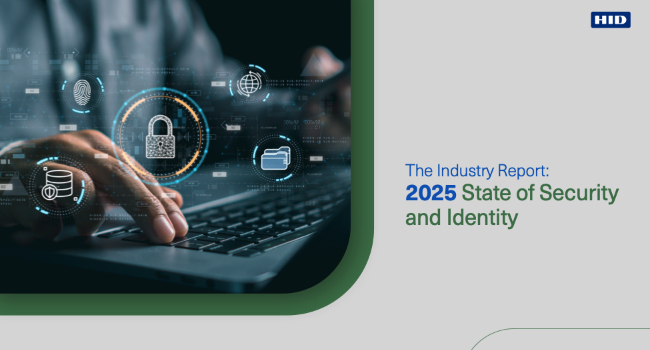
Security Industry Embraces Mobile Credentials, Biometrics and AI, New Trends Report From HID Finds
As organizations navigate an increasingly complex threat landscape, security leaders are making strategic shifts toward unified platforms and emerging technologies, according to the newly released 2025 State of Security and Identity Report from HID. The comprehensive study gathered responses from 1,800 partners, end users, and security and IT personnel worldwide, and reveals a significant transformation in how businesses are approaching security, with mobile credentials and artificial intelligence emerging as key drivers of innovation.
"The security industry is at a pivotal moment where the integration of modern technology with existing infrastructure is no longer optional—it's imperative," said Ramesh Songukrishnasamy, Sr. VP of Engineering at HID. "The fact that 73% of security leaders now prioritize software-driven unified solutions shows we've moved beyond traditional siloed approaches. Organizations are demanding platforms that can scale with their needs while providing actionable intelligence."
Key findings from the report include:
The rapid rise of mobile credentials, with 61% of security leaders identifying their proliferation as a top trend, signals a significant shift away from traditional access methods. Nearly two-thirds are either deploying or planning to deploy mobile solutions. Concurrently, demand for biometric technologies such as fingerprint, iris, and facial recognition is on the rise: about 35% of respondents currently use biometric technology, while 13% plan to, indicating significant growth potential in this segment.
Growing demand for unified security management solutions that streamline operations
As organizations diversify security technology today, many security leaders (67%) are making moves to adopt software-driven security solutions, citing that unifying multiple data collection methodologies would be “somewhat” or “very important” (73%) to their organization.
Strong preference for open platforms that facilitate seamless integration
Interoperability has become synonymous with progress across the security industry over the last few years, and the trend continues as more than half of security professionals reported open solutions as being “extremely” or “very” important to their organizations.
Strategic focus on converging platform solutions rather than standalone products Nearly two thirds of organizations and 73% of integrators and consultants report a shift toward software-driven security solutions that bridge physical and digital functions like video surveillance, access control, and intrusion detection into a more unified platform.
Significant channel transformation driven by digital innovation
The security channel is undergoing significant transformation driven by digital innovation. While 77% of channel partners believe they are adapting well to these changes, growing end-user demand for AI, cloud solutions, IoT integration, and advanced analytics is reshaping service expectations. To thrive, the channel must continuously evolve and adapt to meet the evolving needs of the market and keep pace with digital transformation within the security sector.
Accelerated adoption of AI agents to enhance security operations AI agents are being rapidly adopted to enhance security operations. Use cases are proliferating across access control, identity management, video, and security management platforms. Key benefits cited include improved efficiency and speed of security processes (50%) and enhanced real-time data analysis capabilities (47%).
Continued emphasis on sustainability in security decision-making, budget allowing.
Sustainability is still a key factor in security decision-making, with 75% of security leaders now factoring it into their solution selection process. However, sustainability is not the most critical factor when selecting new solutions as security and cost-effectiveness are still the highest priority for 80% of integrators and consultants.
The full report includes additional global data and further analysis. Read it in its entirety here.